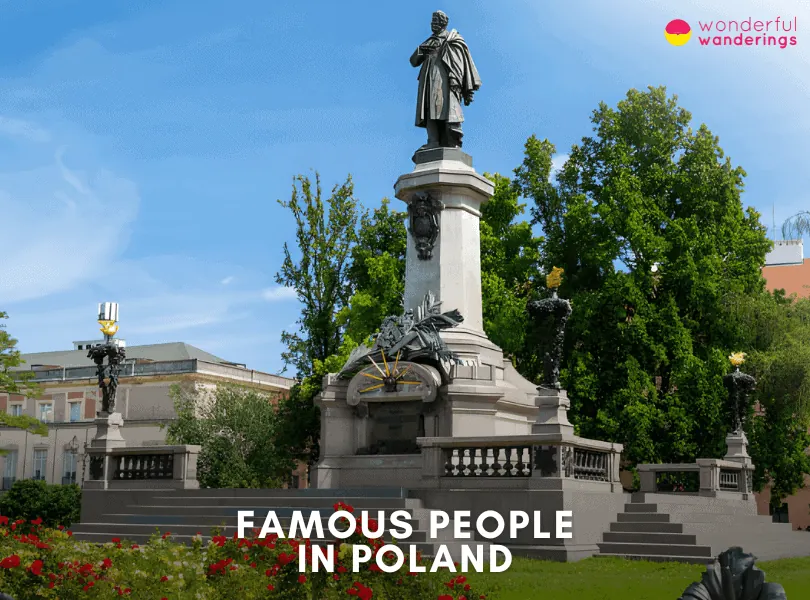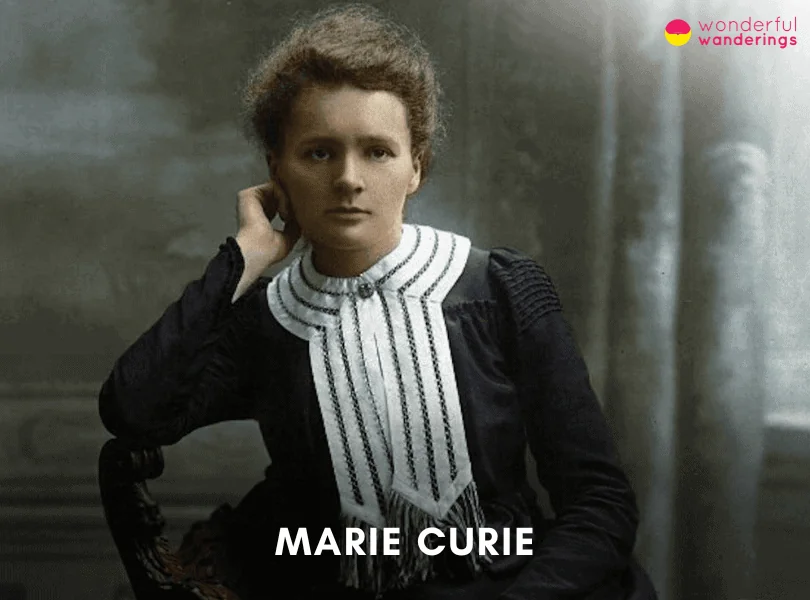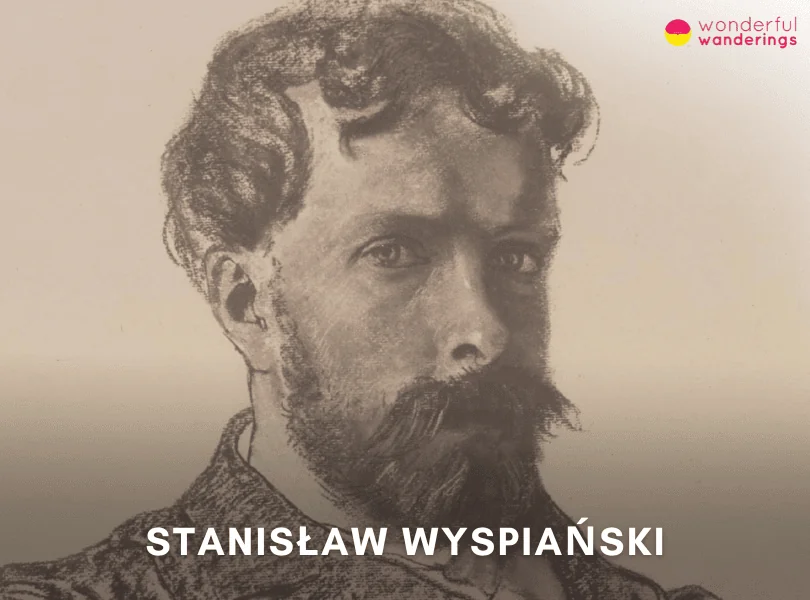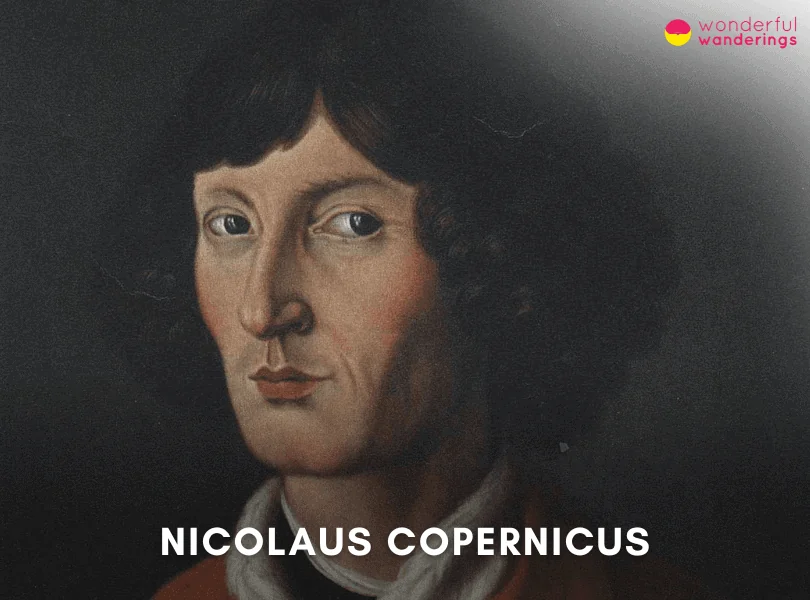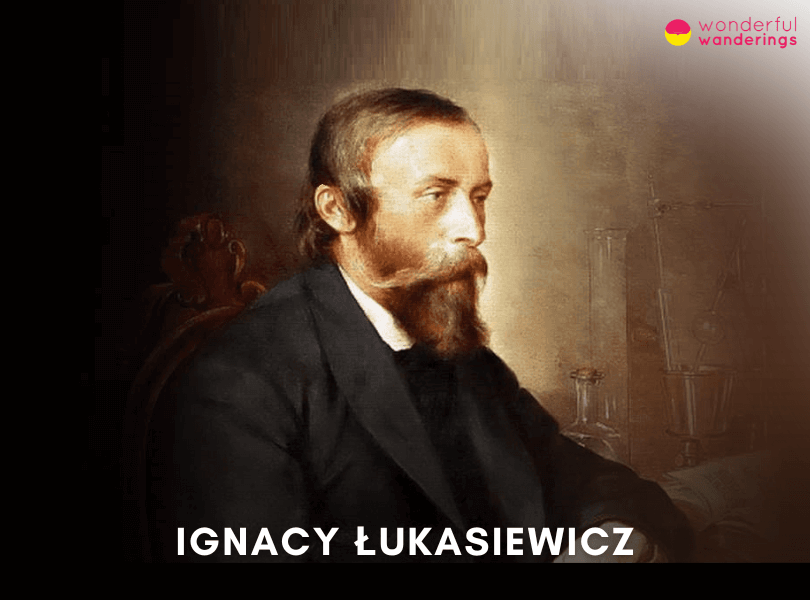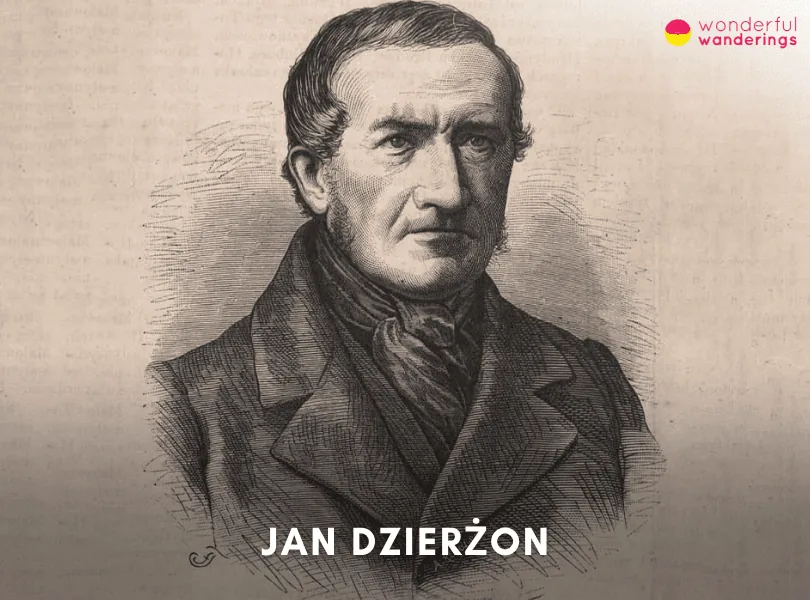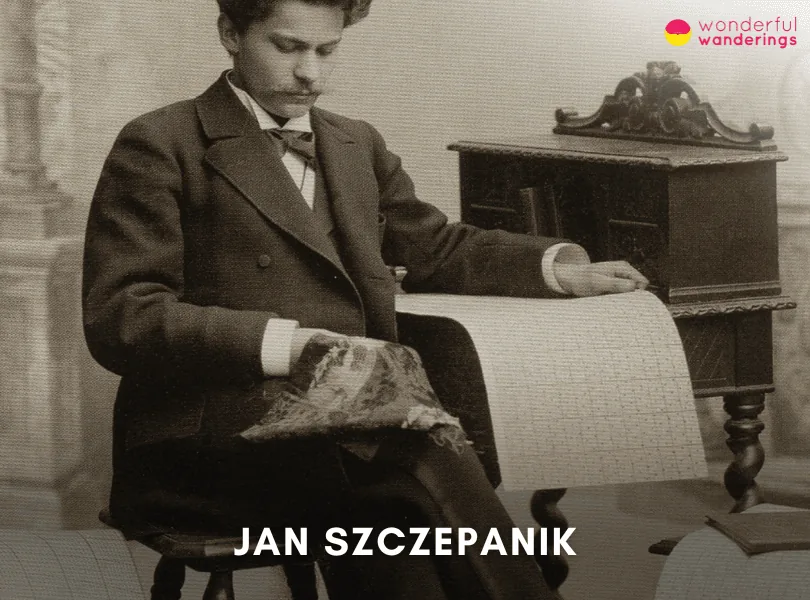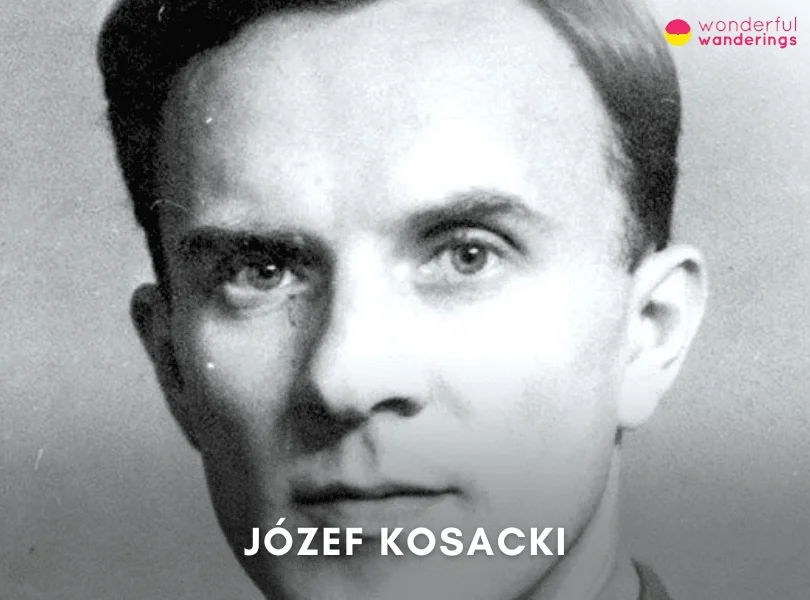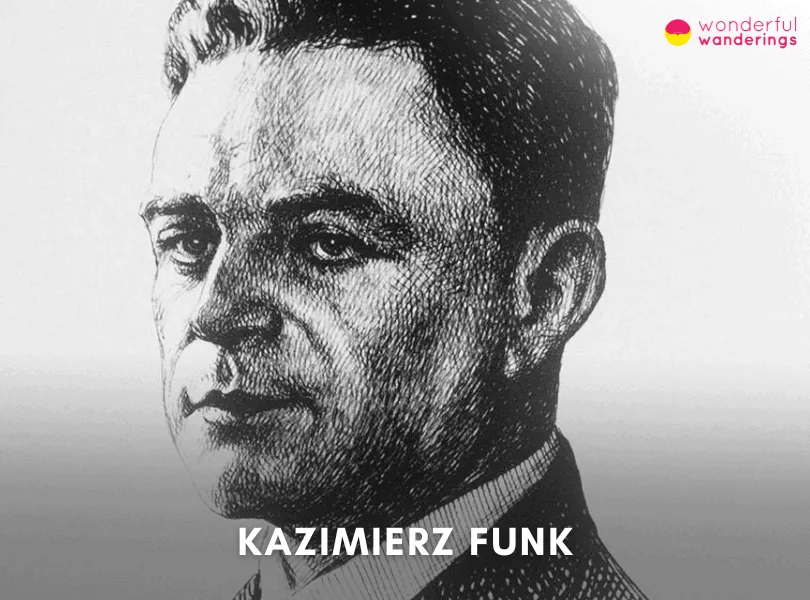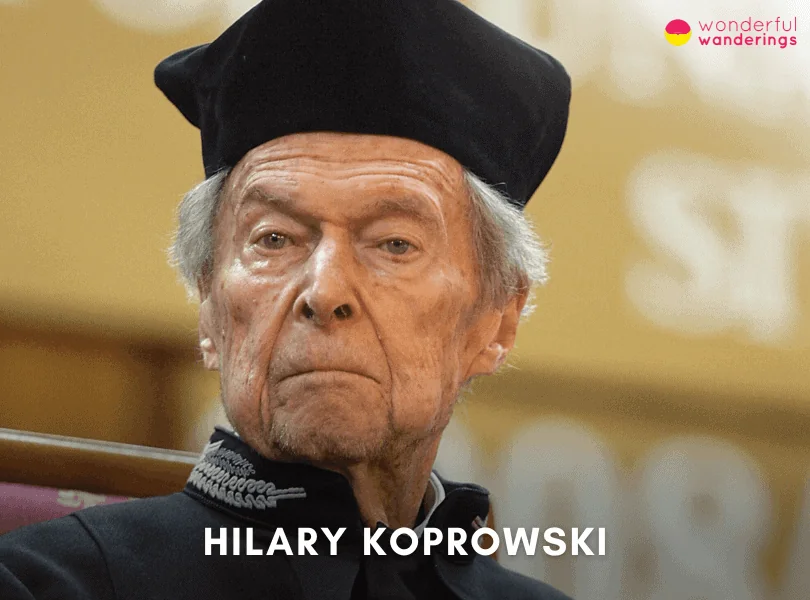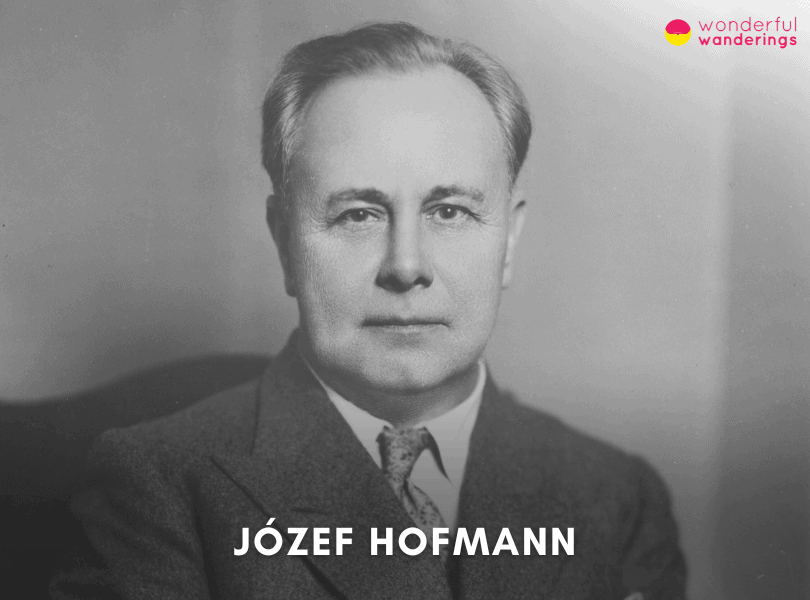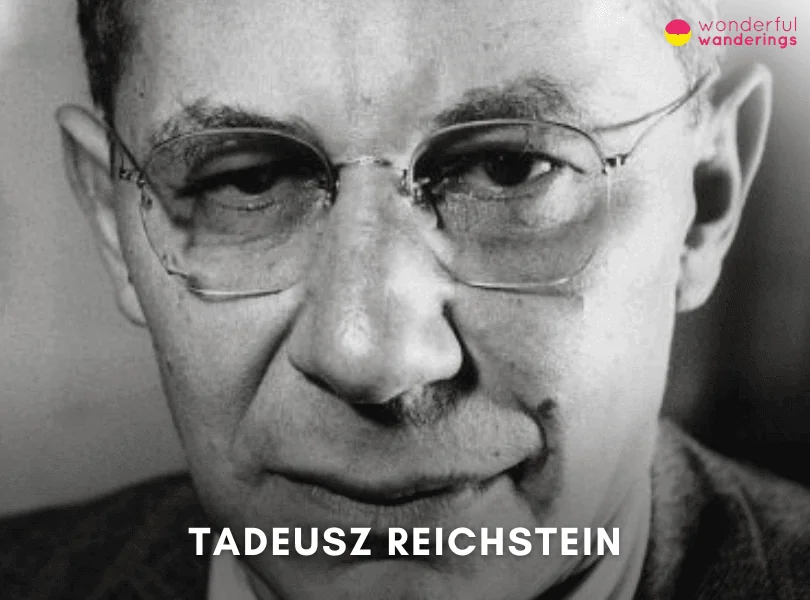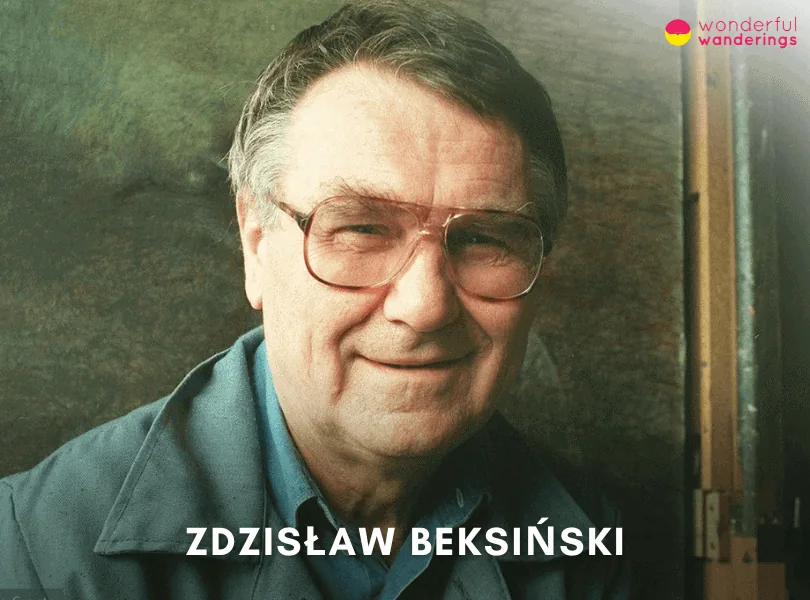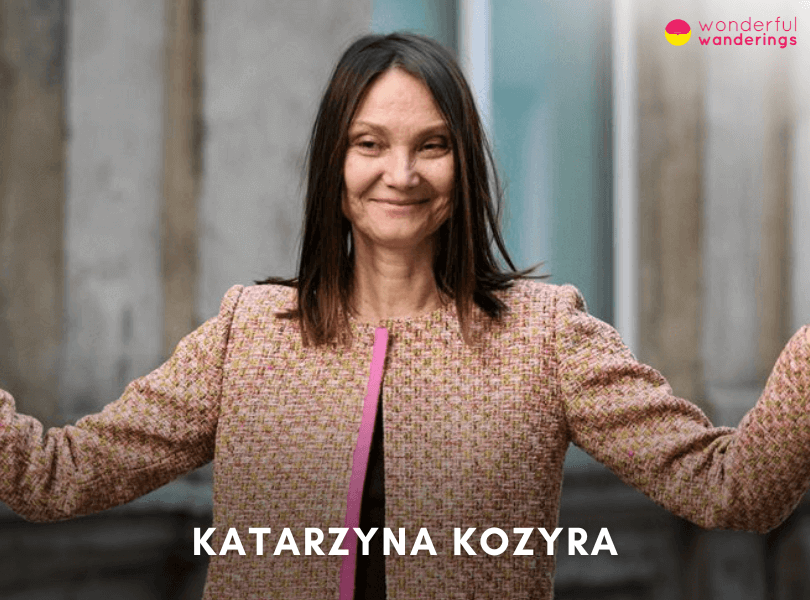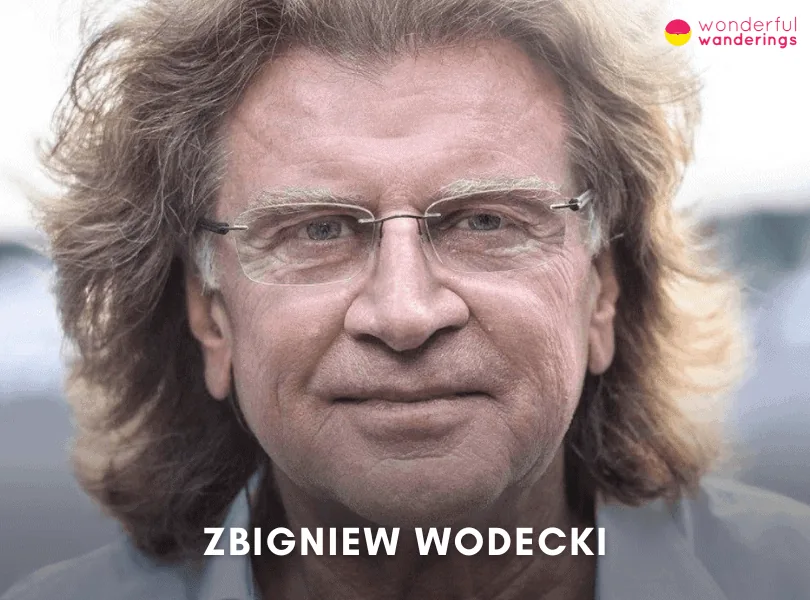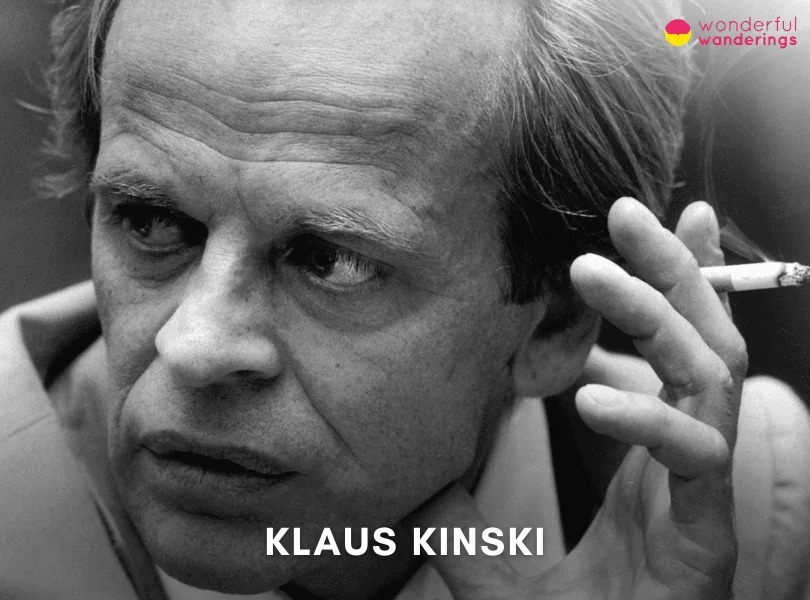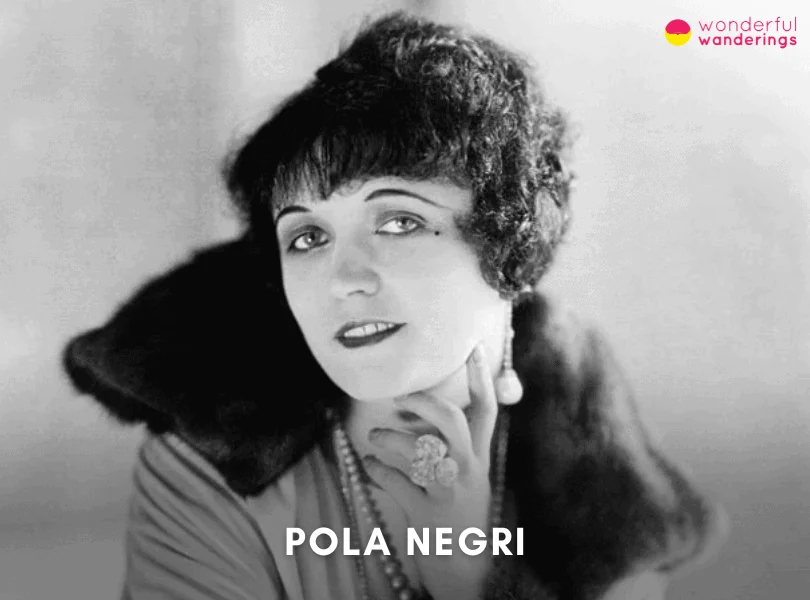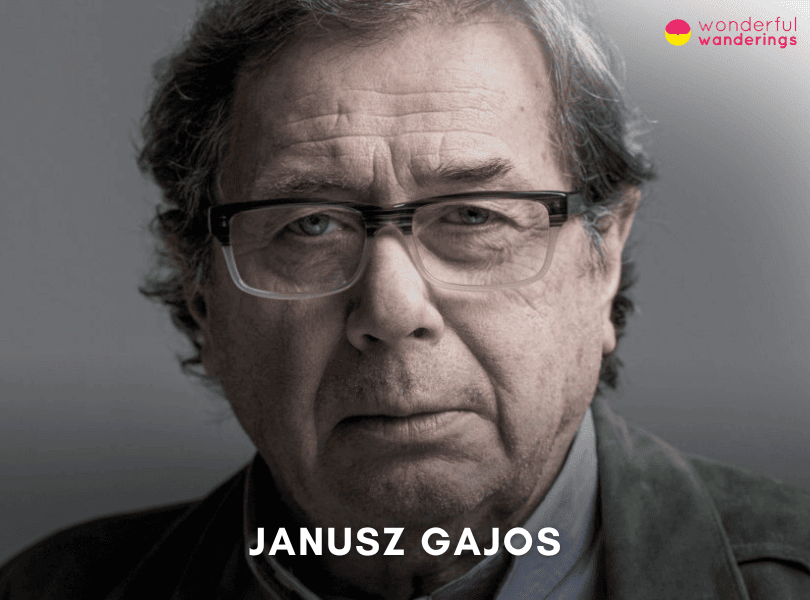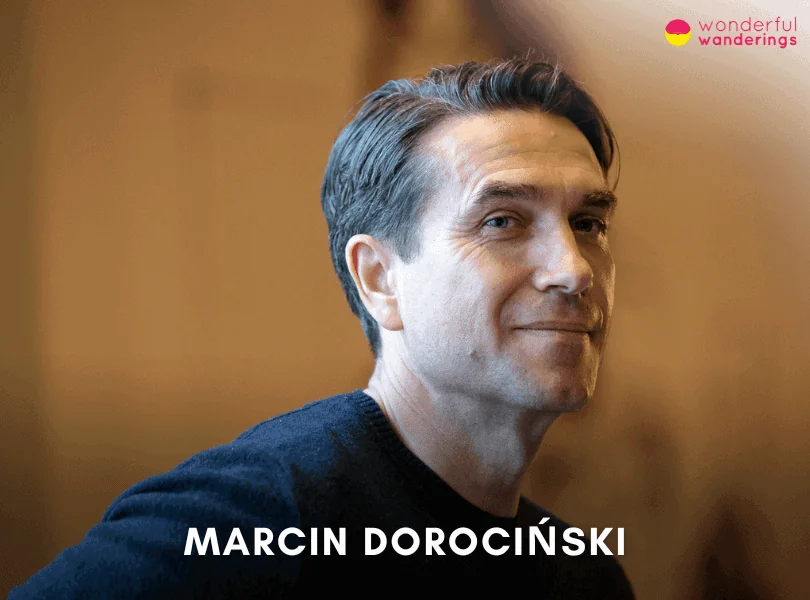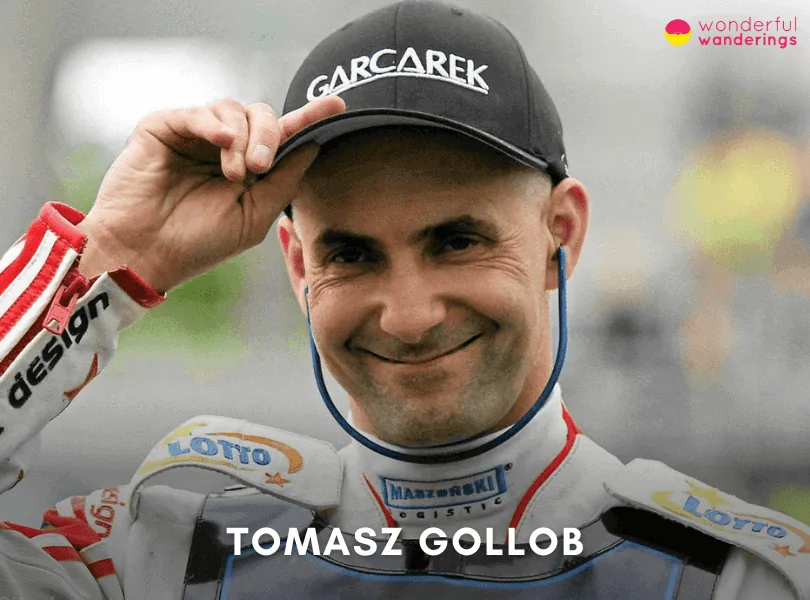Poland is a fertile ground for extraordinary talent, nurturing individuals whose achievements echoed globally. This narrative celebrates Poles by birth who etched their names in the annals of history through their remarkable feats. Among them is the illustrious inventor Marie Curie, whose discoveries in radioactivity left a lasting scientific legacy. The record books honor Krystian Herba, a cyclist who scaled the most stairs on a bicycle, showcasing the indomitable Polish spirit. The art world reveres Stanisław Wyspiański, whose multifaceted genius in painting and design captivated audiences. On the sports field, Robert Lewandowski’s prowess as a football striker earned him international acclaim. Culinary arts, too, have a Polish hero in Wojciech Modest Amaro, whose innovative approach to cuisine redefined Polish gastronomy. These luminaries are a few Poles whose talents inspire and amaze the world.
Listed below are the most famous Polish.
- Marie Curie: Marie Curie, a Polish-born physicist and chemist, discovered radioactivity and the elements polonium and radium, earning two Nobel Prizes. Marie Curie was born on 1867 and died on 1934.
- Krystian Herba: Krystian Herba, born in Rzeszów, Poland, is a record-setting cyclist known for stair-climbing feats. Krystian Herba was born on 1981.
- Stanisław Wyspiański: Stanisław Wyspiański, Polish artist and Fourth Bard, known for ‘The Wedding.’ Stanisław Wyspiański was born on 1869 and died 1907.
- Robert Lewandowski: Robert Lewandowski, a Polish footballer, broke the Bundesliga’s 49-year record with 41 goals in a single season. Robert Lewandowski was born on 1988.
- Wojciech Modest Amaro: Wojciech Modest Amaro, a celebrated Polish chef, redefined Polish cuisine, earning Atelier Amaro Poland’s first Michelin star. He was born on 1972.
1. Marie Curie
Marie Curie, a Polish-born physicist and chemist, is celebrated for her pioneering research on radioactivity, a term she coined. Curie’s work profoundly impacted science, particularly in her native Poland, where she is revered as a national hero. Curie’s resolve never wavered after the loss of her sister and mother and later the death of her husband, Pierre. Marie Curie was born on November 7, 1867 in Warsaw, Poland. She lived and worked in Paris, where she died on July 4, 1934. Curie’s most significant achievement was the discovery of two new elements, polonium and radium. These discoveries advanced the field of radioactivity—a term she coined—and laid the foundation for significant medical advancements, including cancer treatment. Curie’s exceptional achievements were recognized with two Nobel Prizes, making her the first person to receive this honor in two different scientific fields: Physics in 1903 and Chemistry in 1911. Her legacy extends beyond her scientific contributions; Curie broke gender barriers in academia and inspired countless women to pursue careers in science. Curie’s passion for discovery and belief in the public good of scientific research remained at the heart of her work despite challenges, including poverty and societal prejudice against women in science.
2. Krystian Herba
Krystian Herba is a distinguished Polish athlete known for his bicycle trial feats, particularly for setting records in stair climbing on a bicycle. His achievement pushed the limits of possibility in extreme cycling and highlighted Poland’s contributions to the sports world. Herba was born on August 12, 1981, in Rzeszów, Poland. Herba began his sports career in 1995 and quickly rose to prominence, earning multiple medals at the Polish Championships and representing Poland internationally from 1999 to 2009. His most extraordinary feat occurred on October 1, 2016, when he set a world record by climbing 3,461 steps at Willis Tower in Chicago. This challenging endeavor took him to the 66th floor, then back down and up again to the 103rd-floor observation deck, while maintaining balance on his bike without letting his hands or feet touch the ground. Herba’s determination saw him through, surpassing the previous record of 3,339 steps despite experiencing leg cramps in the final 30 floors.
3. Stanisław Wyspiański
Stanisław Wyspiański, a multifaceted Polish artist, is celebrated for his contributions as a playwright, painter, poet and interior designer, integral to the Young Poland Movement. His significance in Poland stems from his patriotic writings and his role in merging modernism with Polish folk traditions, earning him the unofficial title of the Fourth Polish Bard. Wyspiański was born on January 15, 1869 and his life came to an early end on November 28, 1907, due to syphilis. Kraków, the city of his birth, became the canvas for his artistic legacy, where he lived and died. His most celebrated work, “Wesele” (The Wedding), is a national drama offering a profound commentary on the Polish society of his time.
4. Robert Lewandowski
Robert Lewandowski, a Polish professional footballer, is a significant figure in Poland due to his exceptional performance in football, making him a national icon and the country’s global ambassador. Lewandowski, born on August 21, 1988, hails from Warsaw, Poland, where he spent his early life and began his football career. His most notable achievement is breaking the long-standing Bundesliga record by scoring 41 goals in a single season, surpassing Gerd Müller’s previous record of 40 goals set in 1971-72. This accomplishment and his consistent high-level performance have earned him recognition as one of the best strikers in football history.
5. Wojciech Modest Amaro
Wojciech Modest Amaro is a distinguished Polish chef and the proprietor of Atelier Amaro, the first restaurant in Poland to receive a Michelin star, marking a historic moment for Polish gastronomy. His culinary philosophy intertwines nature with science and he is celebrated for redefining Polish cuisine. Amaro was born on February 12, 1972, in Sosnowiec, Poland’s southern part. He has spent significant time in Warsaw, where he established Atelier Amaro and achieved his most notable success. Amaro’s most significant achievement is earning the Michelin star for Atelier Amaro, which elevated his status as a chef and brought international recognition to Polish cuisine.
6. Nicolaus Copernicus
Nicolaus Copernicus, a Polish mathematician and astronomer, is a significant figure in Poland due to his revolutionary contributions to astronomy. Copernicus was born on February 19, 1473, in Torun, Poland. The Gothic tenement house in Torun, where he was born, is considered by many historians as the birthplace of this influential figure. Copernicus spent most of his life in Frombork, Poland, where he served as a canon and died on May 24, 1543. His most notable accomplishment is the proposal of the heliocentric model of the universe, declaring the sun is stationary at the center and the earth revolves around it. This groundbreaking theory challenged the prevailing geocentric model and marked a paradigm shift in scientific thinking.
7. Ignacy Łukasiewicz
Ignacy Łukasiewicz was a Polish pharmacist, engineer, businessman, inventor and philanthropist. Łukasiewicz’s significance in Poland stems from his pioneering work in the oil industry, notably his invention of the modern kerosene lamp in 1853 and the establishment of the world’s first modern oil refinery in 1856. Łukasiewicz was born on March 8, 1822, in Zaduszniki, near Mielec, Kingdom of Poland. His birthplace, Zaduszniki, was where his early life unfolded and he later lived and died on January 7, 1882, in Chorkówka. Łukasiewicz’s most monumental achievement was the development of the kerosene lamp, which revolutionized lighting and marked the beginning of the global petroleum industry. Łukasiewicz’s contributions extended beyond inventions. Łukasiewicz was actively involved in philanthropic efforts and played a role in movements for Polish sovereignty.
8. Jan Dzierżon
Jan Dzierżon was a pioneering Polish apiarist. He is a significant figure in Poland, celebrated for his revolutionary findings in beekeeping. Dzierżon was born on January 16, 1811, in Łowkowice village in Poland. He spent most of his life in this region, where he died on October 26, 1906. His most notable achievement was the discovery of parthenogenesis in bees, a groundbreaking contribution to the field of apiculture. Dzierżon’s innovative work extended to the design of the first movable-frame beehive, significantly improving the ease of hive manipulation. His contributions to apiculture earned him the title of “father of modern beekeeping”.
9. Jan Szczepanik
Jan Szczepanik is a Polish inventor. Szczepanik is a significant figure in Poland for his numerous inventions and technical solutions that contributed to photography, film development and the textile industry. He was born on June 13, 1872, in Rudniki, Austrian Poland. Szczepanik’s birthplace, Rudniki, is now part of Ukraine. He grew up in Zręcin, in the industrial region of Krosno and later lived in Tarnów. He died on April 18, 1926, in Tarnów, Second Polish Republic. Szczepanik’s most notable achievement is the telectroscope, an apparatus for distant images and sound reproduction, which laid the groundwork for modern television and radio broadcasting.
10. Józef Kosacki
Józef Kosacki was a Polish professor, engineer and inventor. He served as an officer in the Polish Army during World War II. Kosacki is recognized for his significant contribution to Poland and the world as the inventor of the first portable mine detector. This invention, developed during World War II, is one of the most important Polish contributions to the Allied victory. Kosacki was born on April 21, 1909. Kosacki’s birthplace and residence was Poland. He died on April 26, 1990. His most notable accomplishment, the Polish mine detector, has saved countless lives. Its basic design remained in use for over 50 years.
11. Kazimierz Funk
Kazimierz Funk, often anglicized as Casimir Funk, was a Polish biochemist. He is celebrated in Poland and globally for his pioneering work in nutritional research, particularly for formulating the concept of vitamins. His groundbreaking discovery and naming of vitamins marked a significant scientific achievement, proving that these compounds are essential for the proper functioning of the body. Funk’s work in Poland included studying nicotinic acid, hormones and the isolation of insulin, contributing to Poland becoming the third-largest producer of insulin in the world. Funk was born on February 23, 1884, in Warsaw, Poland and died on November 19, 1967, in Albany, New York, U.S. His most significant accomplishment was the discovery and naming of vitamins, a term he coined from “vital amines”. This discovery revolutionized our understanding of health and disease, leading to numerous vitamin formulas and pharmaceutical product development.
12. Hilary Koprowski
Hilary Koprowski is a Polish virologist and immunologist. Koprowski’s significance in Poland and globally stems from his pioneering work in vaccine development, most notably the world’s first oral polio vaccine. Koprowski was born on December 5, 1916, in Warsaw, Poland. He spent his life in various locations, including Warsaw, where he was born and the United States. He died on April 11, 2013, in Wynnewood, Pennsylvania, U.S. Koprowski’s most significant achievement was the development of the first effective oral polio vaccine, a monumental contribution to global health that has saved countless lives. His work in immunology and virology has left an indelible mark on the scientific community and the world at large.
13. Józef Hofmann
Józef Hofmann a Polish-American pianist, composer, music teacher and inventor. His significance in Poland and beyond lies in his extraordinary musical talent and inventive mind. He was considered a prodigy, giving his first concert at the age of 6 and touring the United States at 11. Hofmann was born on January 20, 1876, in Podgórze, a district of Kraków, in present-day Poland. He lived most of his life in the United States, where he died on February 16, 1957, in Los Angeles, California. Hofmann’s performances, particularly of Frédéric Chopin’s music, were highly acclaimed and he was regarded by Rachmaninoff as the greatest pianist in the world. Hofmann was also an inventor, credited with the paperclip creation, a universal tool in modern offices. His life and work have left a lasting impact on the music world and the broader sphere of invention.
14. Tadeusz Reichstein
Tadeusz Reichstein is a Polish-born Swiss chemist. His significance in Poland and globally stems from his groundbreaking work in the chemistry and medicine field. He synthesized vitamin C in 1933, known as the Reichstein process. Reichstein was born on July 20, 1897, in Włocławek, Poland. He spent his early life in Kyiv, Ukraine, before moving to Zurich, Switzerland, where he lived until his death on August 1, 1996. His most notable achievement was the isolation and explanation of the constitution of aldosterone and cortisone, the adrenal cortex hormones. This work led to his receipt of the Nobel Prize in Physiology or Medicine in 1950, shared with E.C. Kendall and P.S. Hench. Reichstein’s scientific contributions profoundly impacted the medical field, particularly in arthritis and Addison’s disease treatment.
15. Jerzy Górski
Jerzy Górski is a significant figure in Poland for his remarkable transformation and athletic prowess. He overcame a severe heroin addiction to become a world champion in the double Ironman triathlon, a feat that earned him recognition and numerous awards, including the Bronze Medal for Outstanding Sports Achievement. Górski was born on December 4, 1954, in Legnica, Dolnośląskie, Poland. His life story, including his birth in Legnica and his residence in Poland, is immortalized in the film “Breaking the Limits”, depicting his journey from addiction to athletic success. His most notable achievement is winning the World Triathlon Championships Double Ironman competition in 1990.
16. Szymon Kuczynski
Szymon Kuczynski is a prominent figure in the sailing world. Kuczynski was born on October 15, 1980, in Sulechow, Poland. His significance in Poland stems from his remarkable achievement in setting a world record for the smallest yacht to circumnavigate the globe single-handedly. This feat, accomplished without any stops or assistance, took place between 2017 and 2018. Kuczynski embarked on this journey from Plymouth, UK and after sailing nearly 29,000 nautical miles, returned to his starting point. His accomplishment has brought him personal recognition and elevated Poland’s profile in the global sailing community.
17. Zdzisław Beksiński
Zdzisław Beksiński, a Polish artist, is a significant figure in Poland’s cultural history. Beksiński’s importance lies in his unique contributions to dystopian surrealism, a genre he specialized in as a painter, photographer and sculptor. His work, characterized by macabre and otherworldly imagery, had a profound impact on the art world. Beksiński was born on February 24, 1929, in Sanok, Poland. He lived most of his life in Warsaw, where he met his untimely death on February 21, 2005. His most notable achievement was his triumphant solo exhibition of paintings at the Stara Pomaranczarnia in Warsaw in 1964, which played a significant role in his rise as a leading figure in Polish art.
18. Katarzyna Kozyra
Katarzyna Kozyra is a prominent figure in the Polish art scene, known for her work as a video artist, sculptor and installation creator. She was instrumental in the critical art movement in Poland, challenging societal norms and breaking taboos through her art. Kozyra’s work was recognized internationally, with exhibitions at prestigious venues such as Brown University and Carnegie International in the U.S. Kozyra was born in 1963 in Warsaw, Poland. She continues to live and work in Warsaw, as well as in Trento and Berlin. One of her most significant achievements was receiving an honorable mention at the 48th Venice Biennale in 1999 for her video installation.
19. Natalia LL
Natalia LL was a significant figure in the Polish art scene, particularly known for her contributions to feminist art. Natalia LL was born as Natalia Lach-Lachowicz on April 18, 1937, in Żywiec, Poland. Natalia LL’s work, which spanned painting, photography, drawing, performance and video art, was often provocative and challenged societal norms. She lived and worked in Wrocław and died on August 12, 2022. Her most notable work, “Consumer Art” (1972), critiqued consumerism and the objectification of women, making a significant impact on the international feminist art movement. This work, along with others, led to her recognition and participation in exhibitions worldwide. Natalia LL’s influence extended to her role as a senior lecturer at the University of Fine Arts in Poznań from 2004 to 2013. Her contributions to Polish culture were recognized with the Silver Medal for Merit to Culture – Gloria Artis in 2007.
20. Frederic Chopin
Frederic Chopin is a celebrated composer and pianist of the Romantic period. His importance in Poland is immense, as he is considered a national treasure, with his music deeply influenced by Polish culture. Chopin was born as Fryderyk Franciszek Chopin on March 1, 1810, in Żelazowa Wola, near Warsaw, Poland. He spent his life between Poland and France, with his father being French and his mother Polish. He lived in Warsaw until 1832, after which he moved to Paris. His death occurred in Paris on October 17, 1849. Chopin’s most significant accomplishment is his contribution to piano music. He is best known for his solo pieces for piano and his piano concerti, with his work making the piano the most popular musical instrument of the 19th century. His most famous piece is “Nocturne op.9 no. 2”.
21. Zbigniew Wodecki
Zbigniew Wodecki is a prominent figure in Polish music. His significance in Poland stems from his multifaceted talent as a singer, multi-instrumentalist, composer and TV presenter. Wodecki was born on May 6, 1950, in Kraków, Poland. His musical journey began at age five, when he started playing the violin. His career took off when he won the first award for debuting artists at the 1972 Opole, a significant event in Polish pop music. His life and career were deeply rooted in Poland, where he lived until his death on May 22, 2017, in Warsaw. Wodecki’s most notable achievement is his enduring influence on Polish pop music, with hits like “Chałupy Welcome To” and “Zacznij od Bacha”. He is remembered for his theme song for the children’s animated TV series, Maya the Bee. His contributions to music and his impact on Polish culture made him an irreplaceable icon in Poland’s music history.
22. Edyta Górniak
Edyta Górniak, a prominent Polish pop singer. She is celebrated for her significant contributions to Polish pop music and her influence extends beyond Poland’s borders. Górniak was born on November 14, 1972, in Ziębice, Poland. She has lived in Poland throughout her career, contributing significantly to the country’s cultural and musical landscape. Her career began in musical theater in 1990 and she later gained international recognition when she represented Poland in the 1994 Eurovision Song Contest, securing second place with her song “To nie ja!” This achievement remains the highest for Poland in the contest’s history. Górniak continued to make her mark in the music industry, with her songs being covered by other artists and achieving international success.
23. Dawid Podsiadło
Dawid Podsiadło, a Polish singer-songwriter. He is a significant figure in Poland’s music scene, having won the second series of X Factor in 2012. His music resonates with the Polish audience and he has been instrumental in shaping the country’s music industry. Podsiadło was born on May 23, 1993, in Dąbrowa Górnicza, Poland. He continues to live in his birthplace, Dąbrowa Górnicza. Podsiadło’s second solo album, “Annoyance and Disappointment”, debuted at number one in Poland and was certified Diamond, marking a significant achievement in his career. His fourth studio album, “Lata Dwudzieste”, was hailed as a triumph, improving on almost every aspect of his previous work.
24. Michał Szpak
Michał Szpak is a prominent figure in the Polish music scene. His significance in Poland stems from his musical achievements, particularly his representation of Poland in the 2016 Eurovision Song Contest. Szpak was born on November 26, 1990, in Jasło, Poland. His life journey took him from Jasło, his birthplace, to Warsaw, where he currently resides. His most notable accomplishment is his performance in the Eurovision Song Contest, where he presented the song “Color of Your Life”. This achievement elevated his career and brought international recognition to Polish music.
25. Klaus Kinski
Klaus Kinski was a German actor of Polish descent known for his intense and eccentric performances in over 130 films. Kinski’s significance in Poland stems from his birthplace and his contributions to cinema as a self-taught actor with a unique presence, often collaborating with director Werner Herzog. Klaus Kinski was born Klaus Günter Karl Nakszynski on October 18, 1926, in Zoppot, Free City of Danzig (now Sopot, Poland). Kinski died on November 23, 1991, in Lagunitas, California, leaving behind a legacy marked by his powerful on-screen persona and his controversial off-screen life, including a tumultuous autobiography stirring the film industry. His most notable works with Herzog include “Aguirre, the Wrath of God” (1972) and “Fitzcarraldo” (1982), considered his greatest achievements, showcasing his ability to portray driven and obsessive characters.
26. Pola Negri
Pola Negri is a significant figure in Polish and international cinema history, recognized as the first European film star to be contracted in Hollywood and a pioneer of the silent film era. Negri was born Barbara Apolonia Chałupiec on January 3, 1897, in Lipno, Poland. Her birthplace, Lipno, is where she began her journey before moving to Warsaw, where she pursued her artistic ambitions despite early hardships. She died on August 1, 1987, in San Antonio, Texas. Negri’s legacy continues to be honored in Poland and beyond, with awards and remembrances that reflect her status as a trailblazing actress and cultural icon. Negri’s most notable achievement was her transition from European films to becoming a Hollywood icon, where she left an indelible mark on the silent movie industry and was celebrated with a star on the Hollywood Walk of Fame.
27. Daniel Olbrychski
Daniel Olbrychski is a highly respected figure in Polish cinema. His importance in Poland stems from his extensive acting career, with appearances in 180 films and TV productions. Olbrychski’s fame grew after his roles in several Andrzej Wajda movies, including “The Promised Land”. His versatility as an actor is evident in his ability to portray diverse characters. Olbrychski was born on February 27, 1945, in Łowicz, Poland. He lived and worked in Poland throughout his life. He has received numerous awards, including the Stanislavsky Award at the 29th Moscow International Film Festival for his outstanding achievement in acting. Olbrychski’s talents extend beyond acting; he is known for his athletic abilities, performing most of the stunt scenes in his movies.
28. Janusz Gajos
Janusz Gajos is a distinguished actor, director and pedagogue. His significance in Poland stems from his extensive contributions to film, television and theater, earning him recognition as one of Poland’s greatest actors. Gajos was born on September 23, 1939, in Dąbrowa Górnicza, Poland. Gajos spent his formative years in Będzin after moving there at the age of 11. His most notable achievement is his role in the film “Three Colors: White” (1994), which has cemented his legacy in the Polish film industry. He was honored with the Polish Film Award for Lifetime Achievement in 2016. Gajos remains a humble figure, continuing to teach modern roles at Wyższa Szkoła Komunikowania i Mediów Społecznych in Warsaw.
29. Marcin Dorociński
Marcin Dorociński is a prominent Polish actor, celebrated for his portrayals of complex, troubled characters in Polish and international productions. Dorociński’s significance in Poland stems from his exceptional acting skills and his ability to captivate audiences with his performances. He has received several prestigious awards, including the Zbyszek Cybulski’s Award for Best Young Polish Actor in 2005. Dorociński was born on June 22, 1973, in the town of Milanówek, near Warsaw, Poland. He continues to reside in Poland, where he was born and raised. His most notable role is that of Soviet world chess champion Vasily Borgov in the popular series “The Queen’s Gambit”.
30. Justyna Kowalczyk
Justyna Kowalczyk, a Polish cross-country skier, is a significant figure in Poland due to her remarkable achievements in the sport. She was born on January 19, 1983, in Limanowa, Poland, she grew up in the mountainous Goral village of Kasina Wielka. Kowalczyk’s most notable accomplishment is her success in the Olympics, where she won gold medals at the 2010 Vancouver Olympics and the 2014 Sochi Games. This achievement placed her among the greatest in the sport of cross-country skiing. She surpassed ski jumper Adam Malysz as the Polish athlete with the most medals. Kowalczyk retired from competition in 2018.
31. Dariusz Michalczewski
Dariusz Michalczewski is a prominent figure in Polish sports history, known for his exceptional career as a professional boxer from 1991 to 2005. Michalczewski, called “Tiger”, is celebrated for his achievements in the ring, where he held multiple world championships in two weight classes, including the WBA, IBF and WBO light heavyweight titles and the WBO cruiserweight title. His record of 48 wins, 38 by knockout and only 2 losses, with a notable undefeated streak spanning twelve years, underscores his dominance in the sport. Michalczewski was born on May 5, 1968, in Gdansk, Poland. Michalczewski’s most significant accomplishment was unifying the light heavyweight titles and defending them 23 times, nearly matching the legendary Rocky Marciano’s undefeated record. After retiring from boxing, he became an advocate for social causes, including gay rights, in Poland, a testament to his influence beyond the sports realm.
32. Magdalena Gessler
Magdalena Gessler is a prominent figure in the Polish culinary scene. Gessler’s significance in Poland stems from her transformative influence on the country’s dining culture, particularly through her innovative approach to traditional Polish cuisine. Gessler was born as Magdalena Daria Ikonowicz on July 10, 1953, in Komorów, Poland. She spent her early life in Sofia and Havana due to her father’s journalism career, before moving to Madrid to study art. Gessler’s culinary journey began in Madrid, where she managed restaurants and taught cooking courses. She returned to Poland after the death of her first husband, Volkhart Müller and married restaurateur Piotr Gessler. Gessler currently resides in Łomianki, near Warsaw. Gessler’s most notable achievement is her role in popularizing Polish cuisine through her television appearances on shows like Kuchenne Rewolucje, the Polish version of Kitchen Nightmares and as a judge on the Polish edition of MasterChef. She owns several acclaimed restaurants in Warsaw, including Ale Gloria, Venezia, Jadka and Zielnik Cafe.
33. Adam Chrząstowski
Adam Chrząstowski, a prominent figure in Poland’s culinary scene, is recognized for his significant contributions to Polish cuisine. His importance in Poland stems from his role as a chef and co-owner of the successful Ancora restaurant in Kraków, where he showcases his culinary expertise. Chrząstowski’s influence extends beyond his restaurant, as he has been chosen as the official chef of the Polish EU Presidency and hosts his own TV shows. Chrząstowski was born and raised in Poland. He spent his life honing his culinary skills and sharing his passion for food with others. His biggest accomplishment is the creation of the Krakow Capital Menu, an original concept celebrating the city’s culinary heritage. Chrząstowski remains committed to simplicity and flavor in his cooking, demonstrating his respect for the ingredients he uses.
34. Beata Śniechowska
Beata Śniechowska, a prominent figure in Poland’s culinary scene. Her importance in Poland extends beyond her television victory; she is a co-owner and chef at Młoda Polska Bistro, a restaurant paying homage to traditional Polish cuisine with a unique twist. Śniechowska’s commitment to her craft is evident in her decision to leave a Ph.D. program at the University of Technology to fully engage herself in the culinary world. Śniechowska was born and raised in Wrocław, where she continues to reside and contribute to the local gastronomy. She gained national recognition after winning the second edition of the Polish MasterChef. Her biggest accomplishment to date is her victory in MasterChef, which catapulted her into the limelight and paved the way for her successful culinary career.
35. Krzysztof Rabek
Krzysztof Rabek is a chef who made significant contributions to the culinary scene in Poland, known for his work at Odette in Warsaw and his involvement in the Pop Up Ferment project. Rabek’s most notable achievement is his supervision of the culinary side of the Pop Up Ferment project and his role at Odette, where he and his team prepared classics that have been highly praised. He has worked with some of Poland’s top chefs, honing his culinary skills and contributing to the country’s gastronomy.
36. Tomasz Gollob
Tomasz Gollob is a celebrated figure in the motorcycle speedway racing realm. His significance in Poland stems from his remarkable achievements in the sport, making him one of the most recognized sports personalities in the country over the last 30 years. Gollob was born on April 11, 1971, in Bydgoszcz, Poland. He spent most of his career with his hometown club, Bydgoszcz, before moving to Unia. His crowning achievement was winning the World Championship in 2010 at the age of 39, a feat marking him as the most titled Polish speedway rider in history. A motocross accident in 2017 resulted in serious injuries, ending his illustrious career. However, his legacy continues to inspire and influence the world of speedway racing in Poland and beyond.
Who are the most famous Polish scientists and inventors?
Listed below are the most famous Polish scientists and inventors.
- Nicolaus Copernicus: Nicolaus Copernicus was a mathematician and astronomer who revolutionized the understanding of the solar system with his heliocentric theory. His seminal work, “De revolutionibus orbium coelestium”, challenged the geocentric model and laid the groundwork for modern astronomy. Copernicus’ theory was controversial but eventually gained widespread acceptance, fundamentally altering the course of scientific thought. Nicolaus Copernicus was born on 1473 and died on 1543.
- Marie Curie: Marie Curie was a physicist and chemist recognized for her research on radioactivity, a term she coined. She was the first woman to win a Nobel Prize and remains the only person to win Nobel Prizes in two different scientific fields: Physics and Chemistry. Curie’s discovery of the elements polonium and radium and her development of mobile radiography units during World War I have had a lasting impact on science and medicine. Marie Curie was born on 1867 and died on 1934.
- Ignacy Łukasiewicz: Ignacy Łukasiewicz was a pharmacist and a pioneer in the oil industry who invented the modern kerosene lamp. His innovations in the distillation of kerosene and the introduction of the first modern street lamp in Europe significantly advanced the lighting field. Łukasiewicz also played a key role in establishing the world’s first oil refinery, marking the beginning of the global petroleum industry.
Ignacy Łukasiewicz was born on 1822 and died on 1882. - Jan Dzierżon: Jan Dzierżon was an apiarist who made groundbreaking discoveries in the field of beekeeping, including the parthenogenesis of bees. He designed the first practical movable-frame beehive, revolutionizing beekeeping by allowing for the easy transfer of bees and honey harvesting without destroying the hive. Dzierżon’s work significantly influenced modern apiculture practices. Jan Dzierżon was born on 1811 and died on 1906.
- Jan Szczepanik: Jan Szczepanik, often called the “Polish Edison”, held several hundred patents and made over 50 discoveries. His contributions spanned different fields, including textile machinery, electric television, color photography and the optical registration of sound. Szczepanik’s inventions had a lasting impact, particularly in the film industry. Jan Szczepanik was born on 1872 and died on 1926.
- Józef Kosacki: Józef Kosacki was an electrical engineer who invented the Polish mine detector, which was instrumental in the Allied victory during World War II. His invention saved countless lives and is considered one of the most significant Polish contributions to the war effort. Kosacki’s work in military technology remains highly regarded. Józef Kosacki was born on 1909 and died on 1990.
- Kazimierz Funk: Kazimierz Funk was a biochemist who pioneered vitamin research, coining the term “vitamine”, later known as “vitamin”. He hypothesized that certain diseases were caused by vitamin deficiencies, a theory that was later confirmed. Funk’s contributions to nutritional science are widely recognized, although never awarded the Nobel Prize. Kazimierz Funk was born on 1884 and died on 1967.
- Hilary Koprowski: Hilary Koprowski was a virologist and immunologist who developed the world’s first effective live polio vaccine. His work was crucial in the fight against polio and has contributed to the near-eradication of the disease. Koprowski’s vaccine was a significant milestone in immunology and public health history. Hilary Koprowski was born on 1916 and died on 2013.
- Józef Hofmann: Józef Hofmann was a composer who invented the paperclip, reportedly inspired by the shape of a treble clef. He developed one of the earliest mechanical windscreen wipers. While better known for his musical career, Hofmann’s inventions have had a practical impact on everyday life. Józef Hofmann was born on 1876 and died on 1957.
- Tadeusz Reichstein: Tadeusz Reichstein was a chemist who made significant contributions to the field of organic chemistry, including isolating about 29 hormones and determining their structure and chemical relationships. Tadeusz Reichstein synthesized vitamin C around the same time as Sir Walter N. Haworth and his team in England, a major achievement in the vitamin field. Tadeusz Reichstein was born on 1897 and died on 1996.
Who are the most famous Poles who held a special record?
Listed below are the most famous Poles who hold a special record.
- Krystian Herba: Krystian Herba, born on 1981, is a Polish extreme cyclist celebrated for setting the Guinness World Record for the most stairs climbed on a bicycle. He ascended 3,461 steps at Chicago’s Willis Tower in 2016, requiring him to remain balanced on his bike throughout, including during elevator rides between attempts. Herba repeatedly broke his records, with previous achievements including climbing Taipei 101 and the Shanghai World Financial Center. His dedication to extreme cycling and record-breaking made him a notable figure in the world of sports.
- Jerzy Górski: Jerzy Górski, born on 1948, is a Polish endurance athlete and a double Ironman world champion. He set a world record for the Double Ironman Triathlon with 24 hours and 47 minutes in 1990, which stood for many years. Górski’s life story of overcoming drug addiction to become a world champion was depicted in the biographical film “The Fastest” in 2017. His achievements inspired many and contributed to the popularity of triathlon sports in Poland.
- Szymon Kuczynski: Szymon Kuczynski, born on 1980, is a Polish sailor who set the world record for the smallest yacht to circumnavigate the globe single-handedly. In 2018, he completed his solo journey in a 20-foot yacht named Atlantic Puffin, taking over 270 days to cover more than 29,000 nautical miles. Kuczynski’s voyage was a testament to his sailing skills and determination, as he navigated classic sea routes without external medical or technical support, making his record even more impressive.
Who are the most famous Polish artists?
Listed below are the most famous Polish artists.
- Stanisław Wyspiański: Stanisław Wyspiański was a versatile artist known for his work as a playwright, poet and theater director. He was a key figure in the “Young Poland” movement and his work showcased the best of Polish culture while bringing it into the modern world. Wyspiański’s work, characterized by its modernist/neo-romantic style, inspires artists and captivates audiences today. His influence is particularly notable in the realm of graphic arts and stagecraft. Stanisław Wyspiański was born on 1869 and died on 1907.
- Zdzisław Beksiński: Zdzisław Beksiński was a recognized Polish artist known for his surreal, abstract and disturbing paintings. His early phase of creativity, which he called the “fantastic period”, focused on post-apocalyptic piece production featuring deformed figures and themes of death. Despite his passing in 2005, Beksiński’s haunting paintings continue to captivate audiences. Zdzisław Beksiński was born on 1929 and died on 2005.
- Katarzyna Kozyra: Katarzyna Kozyra is a prominent Polish sculptor, installation and video artist who rose to prominence during the 1990s. As a leading member of the Critical Art movement, Kozyra’s work aims to incite controversy and provoke cultural taboos, focusing on issues concerning the sick, old or marginalized. Her contemporary art production continues to challenge and inspire. Katarzyna Kozyra was born on 1962.
- Natalia LL: Natalia LL, born Natalia Lach-Lachowicz, is a multidisciplinary artist who made significant contributions to the Polish art scene. Her work, spanning various mediums, was instrumental in the feminist art movement in Poland. Natalia LL’s art continues to inspire and influence new generations of artists. Natalia LL was born on 1937.
Who are the most famous Polish singers and musicians?
Listed below are the most famous Polish singers and musicians.
- Frederic Chopin: Frederic Chopin was a Polish composer and virtuoso pianist of the Romantic era who left a lasting mark on the world of classical music. His innovative compositions for solo piano, including nocturnes, waltzes and mazurkas, are celebrated for their lyrical melodies and technical precision. Chopin’s works are considered essential in the piano repertoire and he is known for elevating the piano’s status as a solo instrument. His music is characterized by its depth of expression and nuanced pedal use. Chopin spent much of his professional life in Paris and was associated with other influential composers such as Franz Liszt.
Frederic Chopin was born on 1810 and died on 1849. - Zbigniew Wodecki: Zbigniew Wodecki was a versatile Polish musician known for his singing skills, composer and instrumentalist. He began his career as a violinist in the Polish National Radio Symphony Orchestra before venturing into popular music. Wodecki’s hit songs, such as “Zacznij od Bacha” (Start with Bach), showcase his ability to blend classical influences with contemporary pop. He was a beloved figure in Polish entertainment, appearing on television shows and in musicals. His contributions to Polish music were recognized with numerous awards. Zbigniew Wodecki was born on 1950 and died on 2017.
- Edyta Górniak: Edyta Górniak is one of Poland’s most famous pop singers, known for her vocal prowess and range. She gained international recognition after representing Poland in the 1994 Eurovision Song Contest, where she placed second with the song “To nie ja!” (That’s Not Me!) was Poland’s best result then. Górniak’s debut album, “Dotyk” (Touch), released in 1995, was a commercial success and solidified her status as a leading figure in Polish pop music. She has since released multiple albums and singles, earning her numerous awards and accolades in the Polish music industry. Edyta Górniak was born on 1972.
- Dawid Podsiadło: Dawid Podsiadło is a contemporary Polish singer-songwriter who rose to fame after winning the second season of the Polish edition of “X Factor” in 2012. His debut album, “Comfort and Happiness”, quickly became a bestseller in Poland and garnered several music awards, including the Fryderyk Award for Album of the Year. Podsiadło is known for his distinctive voice and thoughtful lyrics, often exploring personal and social themes. His subsequent albums have continued to receive critical and commercial success, making him one of the most influential figures in the modern Polish music scene. Dawid Podsiadło was born on 1993.
- Michał Szpak: Michał Szpak is a Polish singer who gained fame on the inaugural season of the Polish X Factor in 2011. He represented Poland at the Eurovision Song Contest 2016, further establishing his international reputation. His career highlights include winning the Polish national selection for the Eurovision Song Contest and finishing in eighth place at the Eurovision Song Contest 2016 in Stockholm. Michał Szpak was born on 1990.
Who are the most famous Polish actors?
Listed below are the most famous Polish actors.
- Klaus Kinski: Klaus Kinski, born Klaus Günter Karl Nakszynski, was a famous Polish actor known for his intense performance. His career spanned over 40 years, appearing in over 130 films. He gained international recognition for his work with director Werner Herzog, particularly in films like “Aguirre, the Wrath of God”, “Nosferatu”, and “Woyzeck”. Kinski’s acting prowess and prolific output earned him a significant following. Klaus Kinski was born on 1926 and died on 1991.
- Pola Negri: Pola Negri, born Barbara Apolonia Chałupiec, was a celebrated Polish stage and film actress and singer. She achieved worldwide fame during the Hollywood and European film silent and golden eras. Negri remains a legend on the big screen and is the sole female Polish actress to become a world-famous film star. Her acting career spanned several decades, making her one of the most famous Polish actors. Pola Negri was born on 1897 and died on 1987.
- Daniel Olbrychski: Daniel Olbrychski is a famous Polish theater, television and film actor who starred in over a hundred films. He gained popularity in 1965 after acting in Wajda’s “The Ashes”. Olbrychski was the most popular Polish actor for decades and had an important international career. His films won awards at international film festivals, further solidifying his status as a leading actor. Daniel Olbrychski was born on 1945.
- Janusz Gajos: Janusz Gajos is a distinguished Polish actor known for his film and television performances. His acting career spanned several decades and he received numerous awards for his contributions to Polish cinema. His roles ranged from dramatic performances in films like “Body” to comedic turns in TV series like “Ekipa”. His biography was translated into multiple languages, reflecting his global recognition. Janusz Gajos was born on 1939.
- Marcin Dorociński: Marcin Dorociński is one of Poland’s most popular contemporary actors. He has starred in numerous Polish films like “Rose” and “Jack Strong”, earning him critical acclaim and popularity. Dorociński’s performances have been marked by his versatility and ability to portray complex characters, making him a sought-after actor in the Polish film industry. He has also gained international recognition for his role in the Netflix series “The Queen’s Gambit”. Marcin Dorociński was born on 1973.
Who are the most famous Polish sportsmen?
Listed below are the most famous Polish sportsmen.
- Robert Lewandowski: Robert Lewandowski, born on 1988, is a prominent figure in the football world, celebrated for his exceptional skills as a striker. He holds the record for the most caps for the Poland national football team, with 144 appearances. Lewandowski has scored over 76 international goals, making him the all-time top scorer for Poland. His illustrious career includes participation in UEFA Euro 2012, Euro 2016, the 2018 FIFA World Cup and Euro 2020.
- Justyna Kowalczyk: Justyna Kowalczyk, born on 1983, is a cross-country skier who has made a significant impact on the sport. She holds the record for the most wins in the Polish Sports Personality of the Year awards, with five victories. Kowalczyk’s career highlights include winning the Olympic gold in the 10-kilometer (6.21-mile) classical race at the Sochi 2014 Olympics despite suffering from a fractured foot. She dominated the 2010 Vancouver Winter Olympics, claiming gold, silver and bronze in three events. Kowalczyk was a formidable force in cross-country skiing, with 50 individual wins in her career.
- Dariusz Michalczewski: Dariusz Michalczewski, born on 1968, is a celebrated figure in the boxing world. He held world championships in two weight classes, including the WBA, IBF, WBO and lineal light heavyweight titles between 1994 and 2003 and the WBO junior-heavyweight title from 1994 to 1995. His career, marked by his passion and perseverance, has made him a universally recognized figure in the boxing world.
- Tomasz Gollob: Tomasz Gollob, born on 1971, is a recognized figure in the speedway racing world. He is the only Polish rider to have won the Individual Speedway World Championship, which he achieved in 2010. Gollob has won the Polish Championship multiple times and has been a key player in the Polish team’s success in the Speedway World Cup. His career, marked by his speed and skill, has made him a globally recognized figure in the speedway world.
Who are the most famous Polish chefs?
Listed below are the most famous Polish chefs.
- Magdalena Gessler: Magdalena Gessler, born on 1953, is a prominent Polish chef and restaurateur celebrated for innovative Polish cuisine interpretations. She established several successful restaurants, including the acclaimed U Fukiera in Warsaw. Gessler is a television personality known for her role in the Polish edition of Kitchen Nightmares, where she helps struggling restaurants revitalize their menus and operations.
- Wojciech Modest Amaro: Wojciech Modest Amaro, born on 1972, earned international acclaim as a Polish chef for his avant-garde approach to Polish gastronomy. He is Atelier Amaro’s founder, which received the first Michelin Star in Poland. Amaro’s culinary philosophy integrates elements of nature with modern culinary techniques, placing him at the forefront of Poland’s gastronomic innovation. He is recognized as a bestselling author and a judge on Top Chef Poland.
- Adam Chrząstowski: Adam Chrząstowski is a respected Polish chef known for his commitment to sustainable cooking and local Polish ingredients promotion. His culinary expertise was showcased in several high-end restaurants and he is a strong advocate for using seasonal produce to create modern interpretations of traditional Polish dishes.
- Beata Śniechowska: Beata Śniechowska, a winner of the Polish edition of Master Chef, made a name for herself in the culinary world. She is a chef and co-owner of Młoda Polska Bistro, where she draws inspiration from traditional Polish cuisine. Śniechowska’s passion for Polish gastronomy and innovative cooking style distinguished her as a notable chef in Poland.
- Krzysztof Rabek: Krzysztof Rabek is a talented Polish chef who gained recognition for his culinary skills and dedication to Polish cuisine. He has worked in different prestigious kitchens and has a reputation for his meticulous approach to cooking, highlighting local ingredients’ quality and flavor.
What are the most fun facts about Poland?
There are 5 top fun facts about Poland. Firstly, the name “Poland” has its roots in the ancient Slavic tribe known as the “Polanie”, translating to “people living in open fields”. This tribe, which resided in the open fields, played a significant role in shaping Poland’s identity. The term “Polanie” eventually evolved into “Polska”, meaning “Polish land”, which is the common Polish name for Poland today. Secondly, Polish is one of the world’s most challenging languages for English speakers due to its complex grammar system, including seven cases and three genders and intricate pronunciation rules. The language’s word order differs from English and the sounds are subtly different, making it particularly challenging for English speakers. Thirdly, Poland is the ninth-largest country in Europe. It spans 312,696 square kilometers (120,733 square miles) in Central Europe and has 16 administrative provinces. Poland’s population is over 38 million, making it the fifth most populous member of the European Union. Fourthly, Poland has one of the world’s oldest salt mines, the Wieliczka Salt Mine. This mine, located near Kraków, dates back to the 13th century and was in operation until 1996. It has been a World Heritage site since 1978, showcasing the country’s rich history and cultural heritage. Lastly, Poland has 17 UNESCO World Heritage Sites, reflecting its diverse cultural and natural heritage. These sites include historic cities, Auschwitz Birkenau and Carpathian beech forests. These sites present Poland’s rich history and commitment to preserving its cultural and natural treasures.
Is it expensive to visit Poland?
No, visiting Poland is not expensive. A trip to Poland costs between €400 ($460, £354) to €4000 ($4600, £3540) for a comprehensive experience. Flight costs to Poland range from €420 ($483, £372) to €1000 ($1150, £885). Accommodation in Poland is affordable, with budget hotels starting at €17 ($20, £15) and luxury options going up to €168 ($193, £149). Public transportation is efficient and affordable, with ticket prices between €0.84 ($1, £0.77) to €2.52 ($3, £2.31). Dining out in Poland costs between €5.88 ($6.76, £5.21) to €8.40 ($9.66, £7.44). Attractions like Auschwitz-Birkenau or the Wieliczka Salt Mine cost between €16.80 ($19.32, £14.88) to €33.60 ($38.64, £29.76) per person. The daily costs for a mid-range budget traveler are €127.68 ($146.83, £113.26) per person. The cost of visiting and prices in Poland is less than many other destinations in Europe.
What are the most popular holiday dates in Poland?
Poland has the eight most popular holiday dates. These are New Year’s Day (Nowy Rok) on January 1, Epiphany (Święto Trzech Króli) on January 6, Easter Sunday and Monday (Wielkanoc) in late March or early April, Labor Day (Święto Pracy) on May 1, Constitution Day (Święto Konstytucji 3 Maja) on May 3, Pentecost in late May, Corpus Christi (Boże Ciało) in late May or early June, Assumption Day (Wniebowzięcie Najświętszej Maryi Panny) on August 15, All Saints’ Day (Wszystkich Świętych) on November 1 and the First and Second Days of Christmas (Pierwszy i drugi dzień Bożego Narodzenia) on December 25 and 26. Firstly, New Year’s Day (Nowy Rok) is observed on January 1, marking the commencement of the new year with festivities and fireworks. Secondly, Three Kings’ Day (Święto Trzech Króli), also known as Epiphany, is celebrated on January 6, commemorating the visit of the Magi to the infant Jesus, with parades and family gatherings. Thirdly, Easter (Wielkanoc), which includes Easter Sunday and Easter Monday, is a significant religious holiday with church services and family meals, taking place on dates varying each year according to the lunar calendar. Fourthly, May 1 is Labor Day (Święto Pracy), a day off for workers, while May 3 is Constitution Day (Święto Konstytucji 3 Maja), celebrating the 1791 Constitution with patriotic events. Fifthly, Corpus Christi (Boże Ciało) is observed with religious processions on a date determined by the Easter cycle. Sixthly, the Assumption of Mary (Wniebowzięcie Najświętszej Maryi Panny) on August 15 is a public holiday with religious observances. Seventhly, All Saints’ Day (Wszystkich Świętych) on November 1 is a solemn day for honoring the deceased with visits to cemeteries. Lastly, Christmas (Boże Narodzenie) is celebrated on December 25 and 26, with traditional customs such as the Christmas Eve dinner (Wigilia) and family gatherings. Visitors should read Prices in Poland: Is Poland Expensive? for an in-depth look.
What are the top places to visit in Poland?
Listed below are the top places to visit in Poland.
- Warsaw: Warsaw, the nation’s capital, offers historical landmarks, modern architecture and cultural experiences. The city has the historic Old Town, Łazienki Park with its neoclassical Palace on the Isle, POLIN Museum of the History of Polish Jews, a domineering Palace of Culture and Science, the Royal Castle, Warsaw Uprising Monument and the Chopin Museum. Warsaw is the birthplace of notable figures like Chopin and Marie Curie. The city is best visited in the spring and fall seasons and a stay of 3 days is advisable. Warsaw is one the top places to visit in Poland to engage in the country’s history.
- Krakow: Krakow, a city with a rich history and mesmerizing architecture, is a must-visit. The city’s Old Town has the largest market square in Europe and many delightful churches and old buildings. One of the city’s most significant cultural sites is the 13th-century Wawel Castle. Visitors can pay their respects at Auschwitz, a former concentration and extermination camp during World War II. The best time to visit Krakow is in the spring and fall seasons, with a recommended stay of 3 to 4 days to fully explore its top attractions.
- Gdansk: Gdansk, located on Poland’s northern coastline, has a rich history and beautiful architecture. The city offers the Old Town, Europejskie Centrum Solidarności, Museum of the Second World War, Dluga Street and St. Mary’s Church. Gdansk is known for its waterfront, Mariacka Street with amber jewelers and the historic Ratusz Town Hall. The best times to visit Gdansk are in the spring and fall seasons to avoid extreme weather and crowds. A stay of at least 2 to 3 days is suggested.
- Wroclaw: Wroclaw, known for its old town and architecture, is worth visiting. The city offers a lively atmosphere with its busy market square and many historical sites. Wroclaw’s attractions include the Rynek of Wroclaw, Wroclaw’s Dwarfs, Wroclaw Zoo & Afrykarium, Panorama Racławicka and Ostrow Tumski – Cathedral Island. The city’s climate is most pleasant in spring and fall, making these seasons ideal for visits. A stay of 3 days is best to explore Wroclaw’s highlights.
- Lublin: Lublin, although heavily bombed in the Second World War, has more than enough to justify a visit. The city’s post-war communist-era buildings give Lublin a slightly drab look, with some nice townhouses. Visitors can explore the Old Town, Lublin Castle and the Majdanek State Museum, a former concentration camp from WWII. The city hosts cultural festivals and has a lively arts scene. The city’s climate is most pleasant in spring and fall, making these seasons ideal for visits. A stay of 3 days is advisable to experience Lublin’s rich history and culture.
Find below our best travel guides about Poland.

